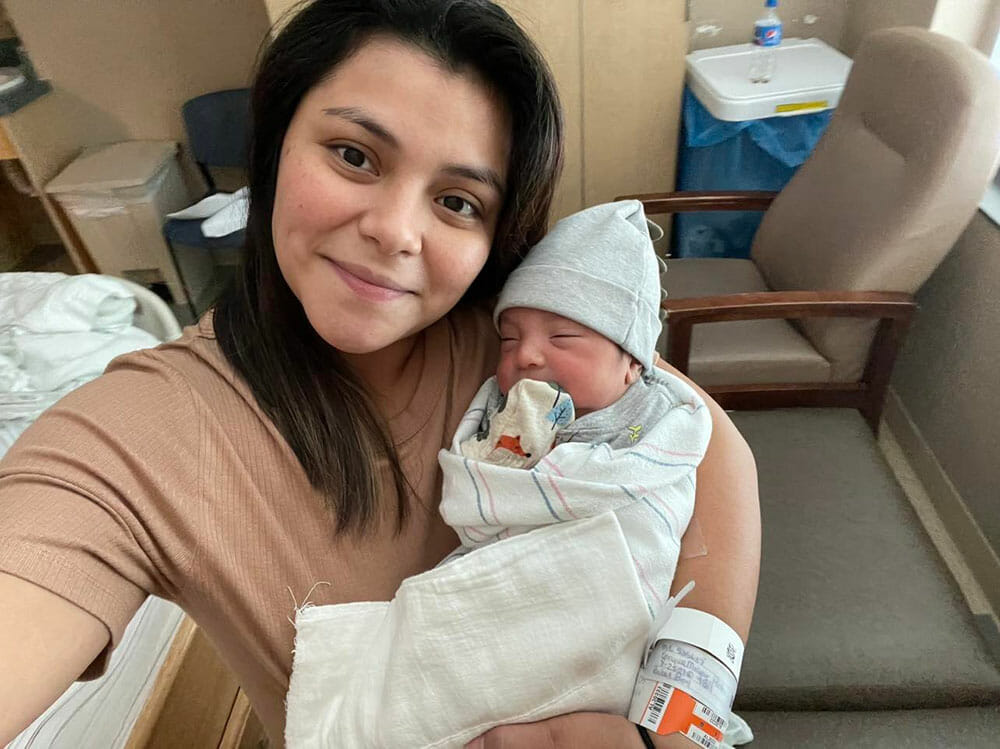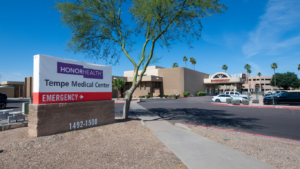Giggles fill the room as Ruth Melgar tickles her infant son and gives him kisses. Her 3-year-old son stands by the bed and watches his little brother in amazement. But just a few months ago, with COVID-19 infections surging again, Melgar worried about getting vaccinated while pregnant.
Eight months into her pregnancy, at one of her prenatal visits, the Phoenix mom told her doctor she wanted to get vaccinated. The doctor didn’t hesitate: It’s completely fine to get the vaccine, he said.
Melgar left the clinic relieved, but at her local Walgreens, she was told she couldn’t be vaccinated.
READ ALSO: As Arizona COVID cases rise, officials push vaccinations and masks for holidays
“The pharmacist told me they couldn’t give me the vaccine because I was just a month away from delivering my baby, and since I was having it through a C-section I couldn’t get the vaccine,” Melgar recalled.
She left the pharmacy scared and unvaccinated. Melgar is one of more than 50% of people in the U.S. who have hesitated to get vaccinated while pregnant, and experts say misinformation and lack of information are fueling this hesitancy.
Denise Link, a retired nurse practitioner and a clinical professor emerita at Arizona State University, doesn’t understand why the pharmacist told Melgar she couldn’t receive the vaccine, but she understands why the mother-to-be decided against it.
“If I’m saying it’s OK and two other people are saying it’s not, what’s the person going to do?” Link said. “If I was pregnant I would probably say, ‘You know what? I’m just not going to take a chance.’ And can you blame them?”
Cronkite News called several Walgreens around Arizona, and pharmacists said Melgar was eligible for vaccination. The Walgreens where Melgar went couldn’t tell us why they denied her request.
The repercussions
A study conducted by the Centers for Disease Control and Prevention found that pregnant people with symptomatic COVID-19 have a 70% greater chance of dying than symptomatic people who aren’t pregnant. The study also indicated pregnant people with COVID-19 could face greater risks during pregnancy, including premature labor and death of the fetus.
One of these risks is preeclampsia, Link said.
“It impacts the circulatory system, and that can have adverse effects on the fetus, affecting delivery (of) … not only oxygen but nutrients across the placenta because the vessels constrict,” Link said. “And that’s where the (mother’s) blood pressure goes up because the heart is trying to pump against this resistance.”
Despite the risks, however, the CDC reports that as of Dec. 4, only 17.8% of pregnant people in the U.S. were fully vaccinated.
The guidance
Scientists have studied the effects of the COVID-19 vaccines in pregnant people, said Roseanne Schuster who is an assistant research scientist at ASU’s School of Human Evolution and Social Change. It’s important for parents-to-be to know this information is readily available.
“The CDC, the American College of Obstetrics and Gynecologists, and the Society for Maternal Fetal Medicine are all on the same page,” Schuster said about pregnant people getting the COVID vaccine.
Link said it’s her job as a healthcare professional to recommend that pregnant people get vaccinated against a disease that has killed more than 790,000 Americans in less than two years.
“Be willing to talk to them about it,” Link said, “and find out what their concerns are and see if I can’t break down some of those myths for them and help them understand where some of these things are coming from.” A main myth is that the vaccine is unsafe for pregnant people.
Meanwhile, Melgar said she plans to get vaccinated now that she’s fully recovered from her C-section.
Story by Karen Marroquin, Cronkite News




